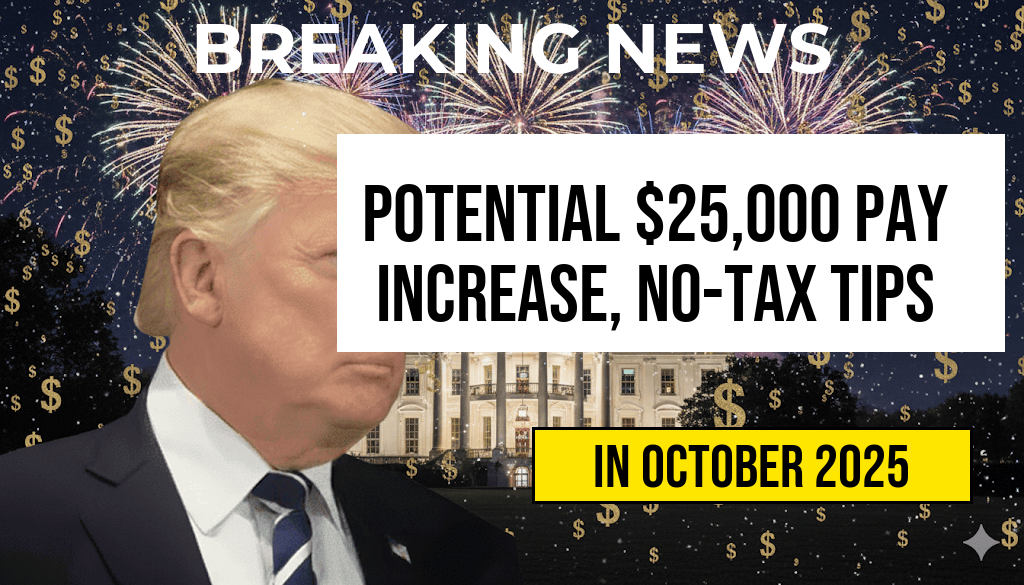Potential $25,000 Paycheck Boosts Without Tax Penalties Could Reshape Employee Compensation
A new proposal gaining traction among policymakers suggests that workers could see their annual paychecks increase by as much as $25,000 through strategies that leverage no-tax tips, while still maintaining compliance with existing tax laws. This approach aims to maximize employee earnings without triggering additional tax liabilities, although payroll taxes would still apply. If implemented, it could significantly impact how employers and employees approach supplemental income and tip reporting, potentially altering the landscape of wage management and tax planning.
Experts emphasize that while such strategies might boost take-home pay, they come with important caveats. The distinction between taxable income and tax-exempt tips remains critical, and workers must navigate the nuances of payroll tax obligations. This development could prompt a broader conversation about the fairness and structure of current tax policies surrounding tips, wages, and supplemental earnings.
Understanding the Proposal: How No-Tax Tips Could Increase Paychecks
The core of the proposal revolves around the idea of utilizing *no-tax tips*—a category of earnings that are exempt from federal income tax—to supplement regular wages. Under current regulations, employees can receive tips directly from customers or through tip-sharing arrangements, with the first $20 of tips per month generally subject to Social Security and Medicare taxes but often not included in taxable income if properly reported.
Proponents argue that by carefully structuring tip reporting and compensation plans, workers could add tens of thousands of dollars in taxable tips annually without crossing into higher tax brackets or incurring penalties. The strategy involves maximizing legally permissible tip income and leveraging existing tax exclusions to enhance overall earnings.
However, the proposal does not suggest eliminating payroll taxes. Instead, it emphasizes the potential for substantial income growth within the framework of current federal laws, provided workers accurately report tips and wages.
Implications for Payroll Taxes and Employee Earnings
While the prospect of boosting paychecks by up to $25,000 sounds appealing, it does not mean workers are exempt from payroll taxes. These taxes—including Social Security and Medicare contributions—continue to apply to all wages and tips, regardless of tax-exempt status for income tax purposes.
| Component | Taxable Income | Payroll Taxes (Social Security & Medicare) |
|---|---|---|
| Regular wages | Yes | Yes |
| No-tax tips | Exempt from income tax, but subject to payroll taxes if reported | Yes |
| Additional tip income (up to $25,000) | Potentially tax-exempt if properly structured | Yes |
This distinction underscores that even if income tax liabilities are minimized through tip reporting strategies, payroll taxes remain a mandatory contribution. For workers, this means that while they could see a significant increase in *net income*, a portion still goes toward Social Security and Medicare.
Potential Benefits and Challenges
- Enhanced Earnings: Employees could see a substantial rise in their take-home pay, especially those in service industries where tipping is prevalent.
- Tax Planning Opportunities: Strategic tip reporting and wage structuring might allow workers to optimize their tax positions within legal boundaries.
- Employer Flexibility: Employers could offer more flexible compensation packages, leveraging tips to supplement wages without increasing payroll costs significantly.
However, challenges persist. Accurate reporting of tips remains a critical concern, with the risk of audits or penalties if discrepancies arise. Moreover, the federal tax code’s complexity means workers and employers alike need expert guidance to navigate these strategies legally.
Legal and Policy Considerations
The proposal has sparked debate about fairness and the potential for abuse. Critics caution that overly aggressive tip structuring could lead to underreporting and tax evasion, undermining revenue collection and the social safety net funded by payroll taxes.
Conversely, advocates argue that optimizing existing legal avenues could benefit low- and middle-income workers, providing a pathway to higher earnings without changing the fundamental tax structure. They also highlight the importance of clear guidelines and oversight to prevent misuse.
For more on current tax laws related to tips and wages, see the [IRS guidelines on tips](https://www.irs.gov/businesses/small-businesses-self-employed/tips) and the [Wikipedia entry on wage taxation](https://en.wikipedia.org/wiki/Taxation_in_the_United_States).
What Workers Should Keep in Mind
Employees considering strategies to increase their income through tips should focus on:
- Maintaining accurate records of all tips received and reported.
- Understanding that payroll taxes still apply, regardless of income tax treatment.
- Consulting with tax professionals to ensure compliance with federal and state laws.
- Staying informed about any legislative changes that could impact tip reporting and taxation.
As discussions continue on reforming the way tips and wages are taxed, workers and employers alike need to stay vigilant about legal obligations and opportunities to maximize earnings within the current system. While the prospect of a $25,000 boost is enticing, responsible reporting and adherence to law remain paramount.
Frequently Asked Questions
What is the main benefit of no-tax tips mentioned in the article?
The main benefit is that your paycheck could increase by up to $25,000 annually when utilizing no-tax tips, providing a significant boost to your earnings without additional tax deductions.
Do payroll taxes still apply if I receive no-tax tips?
Yes, payroll taxes still apply even if you receive no-tax tips. These taxes are separate from income taxes and are mandatory to fund Social Security and Medicare.
How can I potentially increase my paycheck by $25,000?
You can potentially increase your paycheck by up to $25,000 through strategic use of no-tax tips, which are tips that are not subject to income tax, thereby boosting your total earnings before taxes.
Are no-tax tips a legal way to increase my income?
Yes, no-tax tips are legal when properly reported and compliant with tax regulations. They are a legitimate method for earning additional income without increasing taxable income significantly.
What should I be aware of when using no-tax tips to boost my paycheck?
It’s important to understand that payroll taxes still apply, and proper reporting is necessary to stay compliant with tax laws. Consulting a tax professional can help ensure you’re maximizing benefits legally and effectively.

Leave a Reply